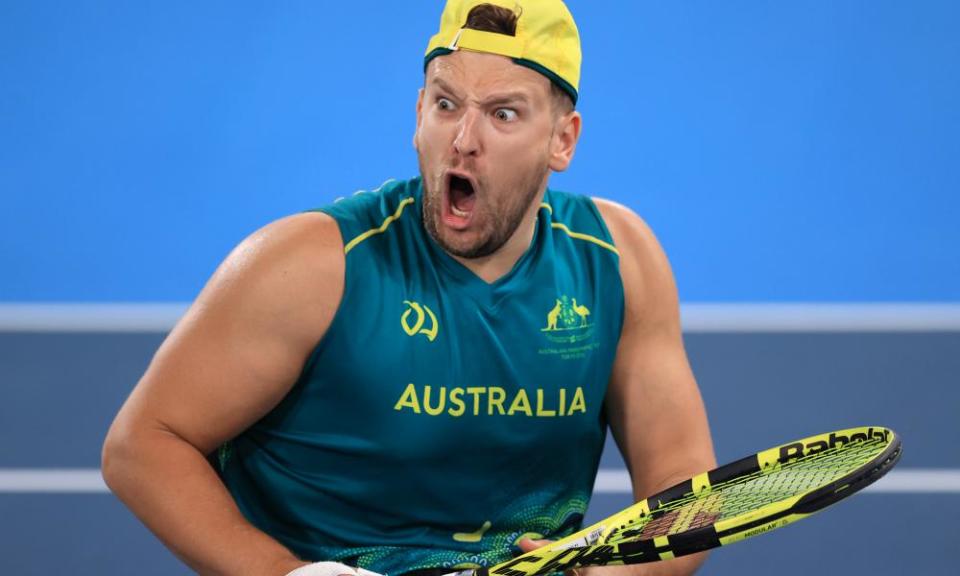Dylan Alcott’s golden year continues at Tokyo Paralympic Games

Two days ago, Dylan Alcott was not talking about the gold medal match he would play in 48 hours’ time. He was not talking about the potential golden slam that has been stalking him throughout 2021. And the world’s best wheelchair tennis player, whose list of on-court exploits is lengthy enough to make ink run dry, was not even talking about himself.
Alcott’s focus was – as it has always been – about changing perceptions towards para-sports. “How cool is this news,” he tweeted from Tokyo soon after the federal government had committed to providing financial support so Australia’s Paralympians can receive the same cash bonus as their able-bodied counterparts.
Related: Tokyo Paralympics 2020: canoe, wheelchair tennis, shooting and more – live!
“It’s because of all of you backing the Paralympic Games and making some noise to make this change happen. We appreciate the support of the Australian public so much, and hope the last week has put some smiles on some faces back home!”
The following day Alcott was telling reporters that advocating for people with disabilities is more important to him than winning tennis tournaments. And on Saturday he was doing that less important thing: winning a tennis tournament. It was a big one, too – a Tokyo 2020 quad singles gold medal, to match his gold in Rio from five years ago.
The 7-6, 6-4 result against long-time Dutch rival Sam Schröder also moved him one step closer to the golden slam he wasn’t talking about. (A golden slam is when a player wins all four grand slam tournaments along with an Olympics or Paralympics in a single calendar year. Only Steffi Graf has done it previously, in 1988.)
In official terms it means the yellow brick road will continue for this golden man with a golden plan, who has already won the 2021 Australian Open, French Open and Wimbledon and now needs only claim the US Open crown to make it a perfect five from five. In Alcott’s consciousness, though, he has already reached Oz. The titles and the medals are the support act to the primary ambition.
“I’m so thankful and grateful that it came into my life, and that I can perform on this big stage … and change perceptions along the way of what people think about us – people with disabilities,” Alcott said through tears after the match.
“Not every person with a disability can be a Paralympian, but they can be a doctor, a lawyer, a mum, a dad, a teacher, an educator, a politician, whatever it is. But they don’t often get the opportunities that we’ve got here to play sport. It means that much to me, it’s huge, and to get it done today was bloody awesome. It makes us feel worthy, it makes us feel loved ... I am gonna come home and drink 10,000 beers with everyone.
“Everyone’s been crapping on about the golden slam, but I couldn‘t care less right now. I’ve got to celebrate this for what it is, which is one of the biggest achievements of my career. It’s the sweetest of all my wins because I got pushed – I shouldn’t have won. I had the expectations of the whole nation on my shoulders, but I think Australia would have survived if I lost and I kept reminding myself of that.
“I was a kid who got bullied about his disability when he was 13 and I didn’t think I had much of a life to live. I hated myself, but I’ve lived the best life of anybody that I’ve ever met and I’m so lucky. It just means so much to me.”
Related: ‘We got pumped tonight’: Alcott and Davidson beaten in wheelchair tennis gold medal match
Alcott began his Paralympics career as a teenager, winning gold with the men’s basketball team in Beijing. After switching to tennis he won two gold medals in Rio, in the quad singles and doubles. Earlier this week, Alcott and Australian partner Heath Davidson lost their quad doubles gold medal match to Schröder and Dutch partner Niels Vink.
And on Saturday, as he converted match point and threw back his head, arms outstretched, there was already a sense this would be the 30-year-old’s fourth and final Games.
“I’m not coming back to the Paralympics ever again and I love it so much, it means so much to me,” he said. “When I was 17 I got to go with the Rollers and we won gold and it was life-changing but Paralympic sport in general, it saved my life.
It was the best thing that ever happened to me and I owe it so much so I took a moment to look around because I’m so grateful it came into my life.”

 Yahoo Sport
Yahoo Sport 





































